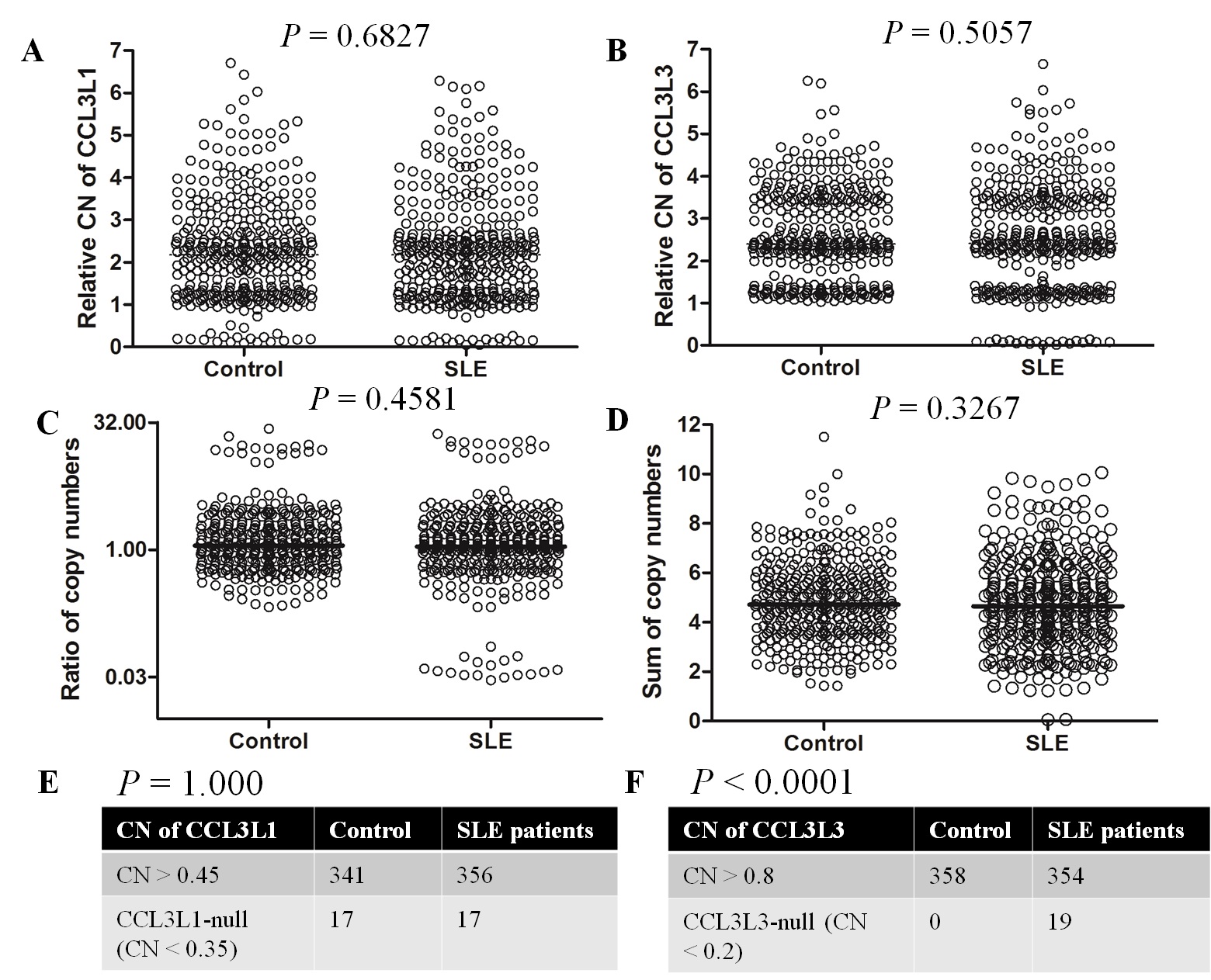Session Information
Session Type: Poster Session A
Session Time: 9:00AM-11:00AM
Background/Purpose: The correlation between the copy number variation of CCL3L1 and susceptibility to systemic lupus erythematosus (SLE), rheumatoid arthritis, Kawasaki disease, and HIV infection has been reported. However, the high level of homology (50 – 99%) within the CCL3L gene family has raised questions on the previously reported associations.
Methods: A modified real competitive PCR (mrcPCR) assay for the specific detection of CCL3L1 and CCL3L3 was developed with consideration of high homology within the CCL3L gene family. The CCL3L1 and CCL3L3 copy numbers were determined in 373 SLE patients and 358 age- and sex-matched controls by the mrcPCR assay and their associations with SLE or SLE manifestations were analyzed.
Results: CCL3L1 or CCL3L3 copy numbers did not have any significant correlation with the prevalence of SLE. However, the absence of the CCL3L3 gene or CCL3L3-null status was observed only in SLE patients (N = 19, P < 0.0001), whereas CCL3L1-null status was not significantly associated with SLE (P = 1.000). In addition, CCL3L3-null status was marginally associated (P = 0.053), and lower CCL3L3 copy status (0 or 1) was significantly associated (P = 0.013) with non-scarring alopecia in patients with SLE.
Conclusion: The CCL3L3-null status may predispose to SLE, and low CCL3L3-copy status was significantly associated with non-scarring alopecia in SLE patients.
 Association of CCL3L3-null status with SLE. A. No significant association of CCL3L1 copy number with SLE. B. No significant association of CCL3L3 copy number with SLE. C. No significant association of the copy number ratio of CCL3L3/CCL3L1 with SLE. D. No significant association of the copy number sum of CCL3L3 and CCL3L1 with SLE. Statistical tests for A-D were performed by the Mann-Whitney test. E. No significant association of CCL3L1-null status with SLE (Fisher’s exact test) F. Significant association of CCL3L3-null status with SLE (Fisher’s exact test).
Association of CCL3L3-null status with SLE. A. No significant association of CCL3L1 copy number with SLE. B. No significant association of CCL3L3 copy number with SLE. C. No significant association of the copy number ratio of CCL3L3/CCL3L1 with SLE. D. No significant association of the copy number sum of CCL3L3 and CCL3L1 with SLE. Statistical tests for A-D were performed by the Mann-Whitney test. E. No significant association of CCL3L1-null status with SLE (Fisher’s exact test) F. Significant association of CCL3L3-null status with SLE (Fisher’s exact test).
To cite this abstract in AMA style:
Lee E, Kim Y, Sim H, Kang E, Won Y, Park E, Song Y, Hong K. CCL3L3–null Status May Predispose to Systemic Lupus Erythematosus and Non-scarring Alopecia [abstract]. Arthritis Rheumatol. 2020; 72 (suppl 10). https://acrabstracts.org/abstract/ccl3l3-null-status-may-predispose-to-systemic-lupus-erythematosus-and-non-scarring-alopecia/. Accessed .« Back to ACR Convergence 2020
ACR Meeting Abstracts - https://acrabstracts.org/abstract/ccl3l3-null-status-may-predispose-to-systemic-lupus-erythematosus-and-non-scarring-alopecia/
